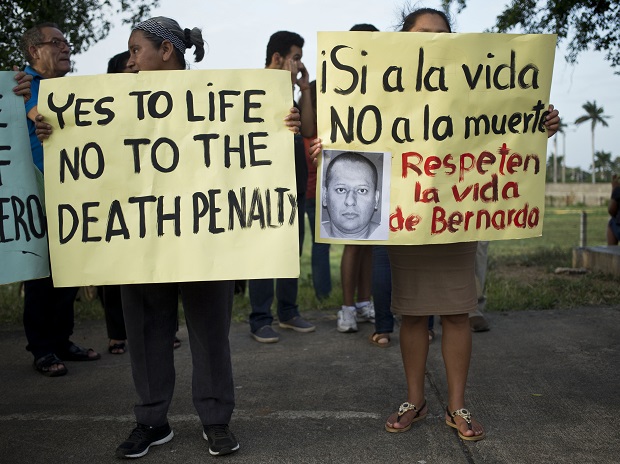Texas appeals court suspends execution of Nicaraguan

Members of the Nicaraguan Human Rights Center, CENIDH, hold signs against the execution in the US of Nicaraguan Bernardo Aban Tercero in Managua, Nicaragua, Monday, Aug. 24, 2015. Tercero, whose age was in dispute during the trial, was sentenced to death in October 2000 in connection with the March 1997 fatal shooting of Robert Berger, 38, a Reagan High School English teacher. The execution is scheduled for next Wednesday Aug. 26 in Huntsville, Texas. The sign at right reads in Spanish, “yes to life, no to death. Respect Bernardo’s life.” AP FILE PHOTO
WASHINGTON, United States—A Texas court on Tuesday stayed the execution of a Nicaraguan convicted of murder, whose death had been scheduled for Wednesday over the objections of his own government.
The Texas appellate court postponed the execution to take up an appeal by Bernardo Tercero, who has spent 15 years on death row after being convicted of a 1997 murder of a school teacher.
Tercero’s lawyers claim he was denied the right to a fair trial.
They also claim a key witness recanted his testimony, and that Tercero was under the age of 18 at the time of the crime and not eligible for the death penalty.
Tercero was scheduled to die at 6.00 p.m. local time (2300 GMT) in Huntsville, Texas on Wednesday.
Article continues after this advertisementRights groups including the Organization of American States’ Inter-American Commission on Human Rights have also claimed Tercero’s rights were violated at trial.
Article continues after this advertisementNicaraguan President Daniel Ortega had asked for mercy and rejected Tercero’s sentence. His country abolished capital punishment in 1979.
Ortega asked US President Barack Obama to intercede and stop the death penalty for humanitarian reasons, calling execution for a crime committed as a minor a “cruel and unusual punishment” in a letter to Obama.
But the US president has few powers to stay a state’s execution.
“I never lost my faith, and my hope that my God should be the only one to take a life,” Tercero’s mother, Lidia, said in tears in her home in Posoltega, Nicaragua, alongside the spared man’s only child.
Tercero was to have been executed for the murder of high school English teacher Robert Berger in front of Berger’s three-year-old daughter, while robbing a Houston dry cleaning business.
Berger was arrested in Nicaragua and returned to the United States in 1999 before his 2000 death sentence.
Texas authorities say Tercero committed a brutal murder and he is subject to the laws of the state.
“When anyone commits a crime in Texas, they are subject to Texas law,” said Texas governor press secretary John Wittman.
RELATED STORY